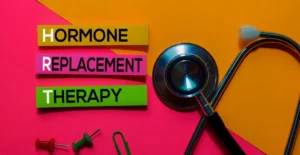Menopause, a natural phase in a woman’s life, marks the end of her reproductive years. While it is a normal biological process, it often comes with a range of physical and emotional challenges. One aspect that deserves special attention is the impact of menopause on mental health. In this blog, we will explore the connection between menopause and mental health, highlighting the importance of recognizing and addressing menopause and mental health treatment methods.
Contents
Understanding Menopause and Its Effects on Mental Health

Menopause, a natural and inevitable part of a woman’s life, signifies the end of her reproductive years. This biological process typically occurs between the ages of 45 and 55, with the average age being around 51. Menopause is characterized by the cessation of menstrual cycles, marking the conclusion of the woman’s ability to conceive. While menopause is primarily associated with physical changes, it is essential to recognize its profound effects on mental health.
Hormonal Fluctuations:
- One of the primary contributors to mental health changes during menopause is the significant decline in estrogen levels. Estrogen, a key female sex hormone, plays a crucial role in regulating neurotransmitters like serotonin and norepinephrine, which are essential for mood stability.
- As estrogen levels fluctuate, women may experience mood swings, irritability, and heightened emotional sensitivity. These hormonal changes can contribute to the development or exacerbation of mental health conditions such as anxiety and depression.
Sleep Disturbances:
- Menopausal women commonly face sleep disturbances, including insomnia and night sweats. Disrupted sleep patterns can lead to fatigue, irritability, and difficulty concentrating.
- Sleep deprivation, coupled with hormonal imbalances, may contribute to increased stress levels and a negative impact on overall mental well-being.
Cognitive Changes:
- The hormonal shifts during menopause can affect cognitive function. Some women report experiencing “brain fog,” characterized by forgetfulness, difficulty concentrating, and memory lapses.
- While these cognitive changes are usually temporary, they can contribute to feelings of frustration and may impact a woman’s confidence in her mental abilities.
Emotional Well-being:
- Menopause can be a time of emotional upheaval, triggered by various factors, including the physical changes associated with aging and the end of fertility. Women may grapple with feelings of loss, a shifting sense of identity, and concerns about body image.
- Addressing emotional well-being is crucial during this period to foster a positive mindset and mitigate the impact of these emotional challenges.
Body Image and Self-Esteem:
- The physical changes that often accompany menopause, such as weight gain, changes in skin elasticity, and alterations in hair texture, can influence a woman’s perception of her body.
- Issues related to body image and self-esteem may contribute to feelings of insecurity and impact mental health. Support and strategies for cultivating a positive self-image are essential components of mental health care during menopause.
Menopause and Mental Health Treatment Options
Navigating the challenges of menopause requires a comprehensive approach that addresses both the physical and mental aspects of this life transition. Here, we’ll explore various treatment options for managing mental health during menopause:
Hormone Replacement Therapy (HRT)

Hormone Replacement Therapy (HRT) is a medical intervention designed to alleviate symptoms associated with hormonal changes, particularly the decline in estrogen and progesterone levels, that occur during menopause. This therapy involves the administration of hormones to replace or supplement those that the body is no longer producing in sufficient amounts. While HRT can effectively manage menopausal symptoms, it is essential to understand its benefits, risks, and considerations.
1. Types of Hormones Used in HRT:
- Estrogen:
- Common Forms: Estradiol, Estrone, Estriol
- Administration Methods: Oral pills, patches, gels, creams, and vaginal rings
- Progesterone:
- Common Forms: Micronized progesterone, Medroxyprogesterone acetate
- Administration Methods: Oral pills, patches, and intrauterine devices (IUDs)
2. Benefits of HRT:
- Relief from Menopausal Symptoms: HRT is highly effective in reducing or eliminating symptoms such as hot flashes, night sweats, and vaginal dryness.
- Improved Mood: Estrogen plays a role in regulating neurotransmitters, and HRT can help stabilize mood, potentially alleviating symptoms of anxiety and depression.
- Bone Health: HRT can contribute to maintaining bone density and reducing the risk of osteoporosis and fractures.
3. Considerations and Risks:
- Individualized Approach: HRT plans should be tailored to each woman based on her medical history, symptoms, and preferences.
- Cardiovascular Risks: Long-term use of HRT may have cardiovascular implications, including an increased risk of blood clots and stroke.
- Breast Cancer Risk: Studies have shown a potential association between prolonged HRT use and an increased risk of breast cancer, necessitating careful consideration and regular breast monitoring.
- Uterine Effects: Women with an intact uterus typically require both estrogen and progesterone to reduce the risk of endometrial cancer.
Antidepressant Medications
Antidepressant medications are one of the treatment options available to help women manage and alleviate these mental health challenges during this transitional period.
1. Types of Antidepressants:
Selective Serotonin Reuptake Inhibitors (SSRIs):
- Examples: Fluoxetine, Sertraline, Escitalopram
- Mechanism: Enhance serotonin levels in the brain, influencing mood regulation.
Serotonin-Norepinephrine Reuptake Inhibitors (SNRIs):
- Examples: Venlafaxine, Duloxetine
- Mechanism: Increase levels of both serotonin and norepinephrine, impacting mood and emotional well-being.
Tricyclic Antidepressants (TCAs):
- Examples: Amitriptyline, Nortriptyline
- Mechanism: Influence serotonin and norepinephrine levels, but may have more side effects compared to SSRIs and SNRIs.
2. Impact on Menopausal Symptoms:
- Mood Stabilization: Antidepressants can help stabilize mood and alleviate symptoms of depression and anxiety, which may be exacerbated during menopause.
- Hot Flashes and Sleep Disturbances: Certain antidepressants, particularly SSRIs and SNRIs, are effective in reducing the frequency and severity of hot flashes and improving sleep patterns.
3. Considerations:
- Individual Response: Responses to antidepressant medications can vary, and finding the right medication may involve a trial-and-error process.
- Side Effects: Common side effects include nausea, dizziness, and sexual dysfunction. However, side effects tend to be temporary and may improve over time.
- Interaction with Hormones: Antidepressants may interact with hormone levels, and adjustments may be necessary depending on individual responses and hormonal fluctuations.
4. Collaboration with Healthcare Providers:
- Comprehensive Assessment: Before prescribing antidepressants, healthcare providers conduct a thorough assessment, considering overall health, medical history, and the specific symptoms experienced by the individual.
- Monitoring and Adjustments: Regular follow-ups are essential to monitor the medication’s effectiveness and address any emerging side effects. Adjustments to the dosage or type of medication may be made as needed.
Counseling and Psychotherapy

Counseling and psychotherapy emerge as invaluable components in the realm of menopause and mental health treatment. As women navigate the multifaceted challenges associated with this life transition, the emotional and psychological support provided by these therapeutic modalities can significantly enhance well-being.
Cognitive-behavioral therapy (CBT), mindfulness-based approaches, and other psychotherapeutic interventions offer a safe space for women to explore and process the emotional intricacies of menopause. By addressing concerns related to mood swings, anxiety, and shifts in self-perception, counseling empowers women with coping mechanisms, promoting a positive mental outlook.
Furthermore, these therapeutic sessions can provide a platform for discussing body image concerns and reinforcing self-esteem, fostering resilience during this transformative phase. The emphasis on open communication, validation, and the development of effective stress-management strategies underscores the pivotal role of counseling and psychotherapy in promoting mental health and overall quality of life for women navigating the challenges of menopause.
One of the best sites to get these therapy services from is TherapyMantra.
Lifestyle Modifications
Lifestyle modifications play a pivotal role in the comprehensive approach to menopause and mental health treatment. As women undergo the transformative journey of menopause, incorporating positive lifestyle changes can significantly contribute to their mental well-being.
- Regular physical activity, such as aerobic exercises and strength training, not only helps manage weight and improve cardiovascular health but also releases endorphins, acting as natural mood enhancers.
- Adopting a balanced and nutritious diet rich in fruits, vegetables, and whole grains supports overall health and can positively influence mood and energy levels.
- Adequate sleep is paramount during menopause, as hormonal fluctuations often contribute to sleep disturbances. Establishing a consistent sleep routine and creating a comfortable sleep environment can alleviate insomnia and enhance cognitive function.
- Stress management techniques, including mindfulness meditation, deep breathing exercises, and yoga, offer effective ways to mitigate the emotional toll of menopausal symptoms.
- Furthermore, engaging in social activities and maintaining strong social connections can combat feelings of isolation and provide emotional support. Sharing experiences with friends, and family, or participating in support groups can create a sense of community and understanding.
- Additionally, setting realistic goals, managing time effectively, and cultivating hobbies contribute to a sense of purpose and fulfillment, positively impacting mental health.
- Limiting the consumption of stimulants like caffeine and alcohol, which can exacerbate anxiety and disrupt sleep, is another essential lifestyle consideration.
Holistically, these lifestyle modifications form a foundation for mental health during menopause, promoting resilience, emotional balance, and an enhanced quality of life. Integrating these changes into daily life empowers women to navigate the challenges of menopause with a holistic and proactive approach to their mental and emotional well-being.
Complementary and Alternative Therapies

Complementary and alternative therapies offer diverse approaches to support mental health during the menopausal transition, providing women with additional tools to manage symptoms and enhance overall well-being. These holistic modalities recognize the interconnectedness of mind, body, and spirit, aiming to promote balance and alleviate the emotional challenges associated with menopause.
- Herbal Supplements: Certain herbs, such as black cohosh and red clover, are believed to have estrogen-like effects and may help alleviate hot flashes and mood swings. However, it’s crucial to consult with healthcare professionals as herbal supplements can interact with medications and have varying efficacy.
- Acupuncture: Acupuncture, an ancient Chinese practice involving the insertion of thin needles into specific points on the body, has shown promise in reducing the frequency and severity of hot flashes. Additionally, it may help alleviate symptoms of anxiety and promote relaxation.
- Yoga and Meditation: Mind-body practices like yoga and meditation can be effective in managing stress, improving mood, and promoting emotional well-being. These practices emphasize mindfulness and relaxation, offering women tools to navigate the emotional fluctuations of menopause.
- Massage Therapy: Massage therapy can provide both physical and emotional benefits. It may help alleviate muscle tension, improve sleep, and reduce symptoms of anxiety and depression. The tactile experience of massage can also contribute to a sense of comfort and relaxation.
- Aromatherapy: Using essential oils through aromatherapy can influence mood and alleviate stress. Scents like lavender and chamomile are known for their calming effects and may be incorporated into self-care practices to promote relaxation and emotional balance.
Community Support and Education
Community support and education play integral roles in fostering mental health and well-being during the transformative phase of menopause. The power of shared experiences, understanding, and open dialogue within a community setting can significantly impact how women navigate the challenges associated with this life transition.
- Support Groups: Participating in menopause-specific support groups offers women a platform to share their experiences, concerns, and coping strategies. These groups create a sense of community, reducing feelings of isolation and fostering empathy among women undergoing similar changes.
- Online Forums and Social Media Communities: Furthermore, Virtual spaces provide accessible platforms for women to connect globally, transcending geographical boundaries. Online forums and social media communities dedicated to menopause allow for real-time interactions, information sharing, and the exchange of emotional support.
Conclusion
Menopause is a multifaceted journey that goes beyond its physical manifestations. Recognizing the impact of menopause on mental health is a crucial step toward providing comprehensive care for women during this transformative phase of life. By integrating hormone management, counseling, lifestyle modifications, and community support, we can empower women to navigate the waves of change with resilience and a positive mental outlook.
If you are facing menopause-related issues, menopause treatment at HerMantra can help. Book your free trial online menopause treatment session now.


